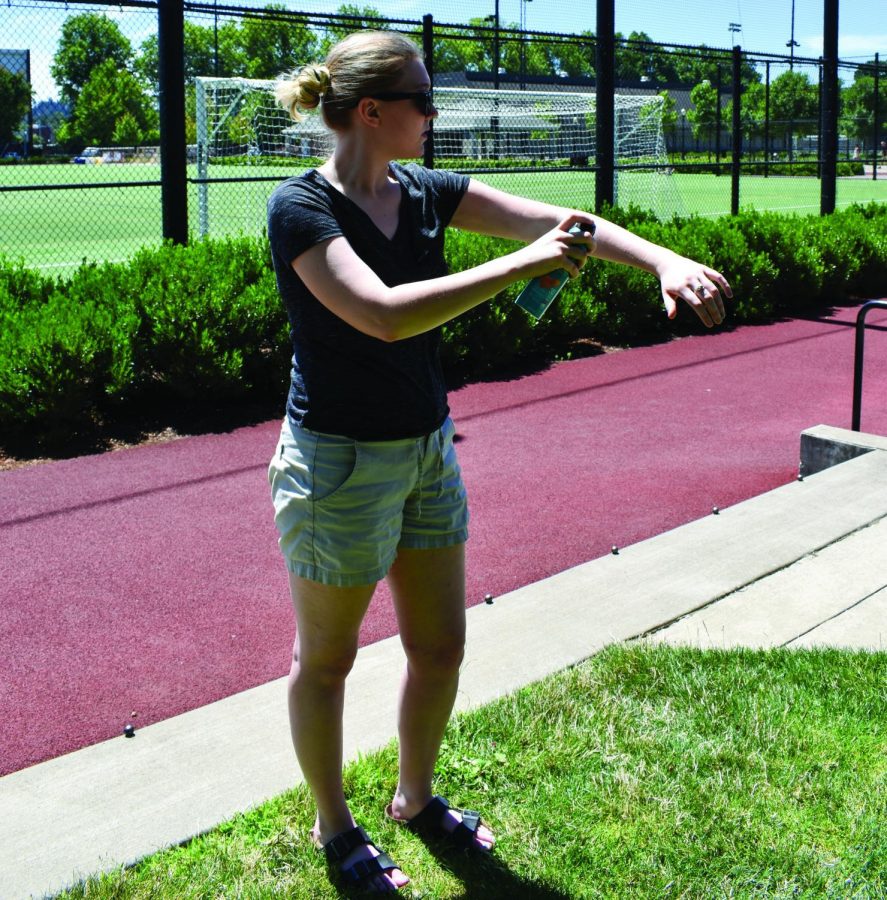Surviving the summer heat
July 31, 2017
As temperatures rise, the heat can lead to a variety of medical issues. Dehydration, heat exhaustion and heat stroke are all conditions that can adversely affect health, according to Connie Hume-Rodman, the director of Clinical Services at Oregon State University’s Student Health Services.
“Dehydration is when the body does not have enough water,” Hume-Rodman said via email. “The more dehydrated you are, the more thirsty, lightheaded, weak or faint you are likely to feel.”
In many cases, individuals do not feel thirsty until they are already dehydrated, according to the Mayo Clinic website. It is important to increase water intake in hot weather and when ill.
Taking frequent breaks from exercise to rehydrate is a simple way to stay healthy, according Dr. Jeffrey Mull, the director of OSU Medical Services.
“Hydrate before and during activity; wear light, breathable clothing; stay in the shade if at all possible,” Mull said in an email. “Avoid outdoor activity in extreme conditions.”
If a person shows signs of any heat illness, getting them out of the sun and into a shaded or cooler area is the best option, according to Mull. Offering cold fluids and removing excess clothing can also help someone suffering from a heat illness. Taking the individual in to receive professional medical attention is also important if their symptoms do not improve.
“There is no set amount of water necessary for an individual,” Mull said via email. “It is best to be aware of the heat and drink fluids frequently instead of waiting until you feel thirsty.”
If not properly treated, dehydration can lead to heat exhaustion, which can later lead to heat stroke, according to Hume-Rodman. When the body does not have enough water, it cannot properly regulate its core temperature through sweating. High core temperatures can lead to an array of problems, including damage to the brain and organs.
“Heat stroke is heat exhaustion with neurological symptoms, such as confusion or seizure,” Hume-Rodman said via email. “To have heat stroke, by definition, the body’s core temperature is elevated due to getting overheated.”
Early or mild heat exhaustion requires prompt action before it becomes serious, according to Hume-Rodman. Symptoms can include loss of consciousness, nausea, muscle cramps and a rapid heart rate. Medical attention should be sought if these symptoms persist. However, symptoms of heat stroke—confusion, seizure or loss of consciousness—require immediate medical attention.
According to Jason Penry, the director of the OSU Performance Lab and a senior instructor in kinesiology, individuals should reduce physical activity in higher temperatures. The harder someone works physically, the more heat they will produce. Heat production and heat loss perform a balancing act. In warm environments, heat production can outspeed heat loss, which leads to higher core temperatures within an individual’s body.
“The prime method for cooling an individual in a warm environment is via evaporation of sweat, and a humid environment reduces the rate at which fluid can evaporate from the skin,” Penry said via email.
According to Penry, thinner individuals experience heat loss more readily because their body type allows them to regulate body temperature more efficiently. For larger individuals, however, physical movement can be particularly stressful because of their lessened ability to lose heat, resulting in a net increase in body temperature.
Heat gain is not just an internal process. It can be worsened by external sources like solar radiation, according to Penry. Exercising on a warm day—particularly a bright, sunny day—can cause an individual to experience heat stress due to the increased absorption of solar radiation.
“This is one of the reasons that you see individuals in desert countries wearing light-colored, loose-fitting robes instead of walking around with no clothes on: the robes help to reduce the heat gain due to solar radiation,” Penry said via email.
Certain pre-existing health problems or medications can also play a part in how severe an individual will be affected by the heat, according to Hume-Rodman.
“Anyone with chronic health conditions should get more specific advice from their clinician,” Hume-Rodman said.
For more information on the topic of heat-related illnesses or safety, you can visit Student Health Services in the Plageman Building.










































































































